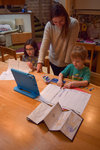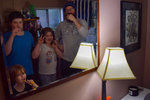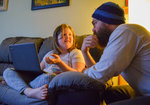



The internet is fraught with remote-learning forums, Facebook posts, and homeschool tips. Across the nation, classrooms are empty, and teachers are anxious. Parents are having sleepless nights worried about school; many leaving their jobs at unprecedented rates—either by choice or by COVID cutbacks-- to help with common core math and at-home workbooks.
And in the Olympia-area, it’s no different.
A display of picture books can be seen behind teacher Lauren Booher while on video chat; a glimpse into what her elementary school students see on any given day during pandemic learning.
“My mode of teaching has changed—I never sat at a desk before,” shares Lauren. “Now, I feel like a YouTuber most of the time.”
In the other room, her third-grader Faith (who also happens to be Lauren’s student), joins Zoom from her iPad. Little brother Jonah, who started Kindergarten this year, does two morning Zooms and is done by lunch. Husband Rob plays the support role, helping where he can.
Last school year, Lauren and the other teachers at Olympia Community School, and teachers around the county and country, shifted into whatever makeshift classroom they could figure out. Since fall, however, Lauren has been able to take over the guest bedroom, bringing her learning supplies within reach, and shutting the door to the rest of her family.
After school, Lauren “comes home from work” and does her best to balance homework time, dinner time, and to leave the teacher role in the guest room. For example, Faith may ask if she has to watch the lesson video about multiplication, when Mom is right there. Lauren recognizes that things need to be fair for all the kids, and for her own self-care to not be teaching repeatedly. So yes, Faith must watch the multiplication video, too.
“Teacher-parents are in this funny position,” says Lauren. “We’re hearing from both sides; we want more, we want less. There’s a real push and pull—I feel both ways too! It really doubles down on that conflicted feeling, ‘Am I meeting everyone’s needs?’ Even our own families are so different.”
Lauren tries to get creative and to take pressure off parents. Normally this time of year would be a culmination from a themed project—with construction paper workbooks, plenty of art supplies and time, and hands-on help. This year, the class is studying the senses, so Lauren challenged her students to look around their homes and find things to make into an eye or an ear. Not only did it give the kids an opportunity to step away from the computer, but Lauren was also clear she didn’t want to put pressure on parents to go out and buy supplies.
“There was an unexpected creativity that came out of using found materials,” she says. “We had jars full of liquid and things made from trash; our biggest successes have been when I force us all to take computer breaks.”
One piece of advice Lauren shares from her teacher/parent perspective is that it’s OK for kids to go into meltdown mode. Lauren believes in the power of a “productive struggle” and says when her kids reach that level—especially with writing—she says she’ll walk away for 10 minutes and lets her kiddo know that whatever she gets on the page is OK. Then, they’ll resume wherever she’s at. “Knowing when to back off is the hardest part,” Lauren concedes.
------------------
Ivy Aho, mom to a preschooler, first-grader and fifth-grader, finds time to talk out in her minivan in the driveway—it’s one of the few private, distraction-free places in her home.
“I think online school is too much,” she shares, along with a sigh. “I was clear with my kids’ teachers that we will not be turning everything in. I set the same expectations with my kids. We are just going to do the best we can.”
The Aho family has an unconventional living arrangement—sharing a 2-bedroom townhouse means the parents’ bedroom and Ivy’s office are in the living room. And with both parents working, life in the Aho household can be pretty upheaved if someone has a homework assignment they don’t understand or an internet connectivity issue.
“I have to pretend not to hate it for my kids’ sake,” says Ivy. “But it’s really hard to manage it all.”
Ivy starts work late so that she can help the kids with the first part of the day, and she describes a typical morning: Back and forth up and down the stairs, the youngest needs a diaper change, someone else spills the milk, the other needs crayons, and so on. “At the end of two hours, it’s not surprising if I’m screaming at people,” she shares.
She feels for her son, Hank, in first grade, who doesn’t get to make the friends he should be making at this age. And while her youngest, Ava, doesn’t quite grasp what remote learning is yet, she was pulled from preschool because the family wasn’t able to afford the costs when Dad Ben needed to cut hours to help with remote school. Ivy’s fifth-grader, Zoe, is enrolled in IEP (Individualized Education Program) classes, and Ivy was worried she may slip behind.
But, Ivy explains, because of Zoe’s IEP, she participates in separate breakout rooms with no additional work assigned. A relief, says Ivy, because her daughter doesn’t want help with homework. “She wants us to be her parents, not her teachers,” she says.
Each family member has had their turn at a meltdown, and one thing Ivy appreciates is that her kids’ teachers are really in-tune to the students' learning styles and are doing their best to adapt and overcome. As part of a Montessori-based curriculum, Hank’s teacher is the same as he had in Kindergarten and can sense the right approach if he’s having a hard day.
Ivy and Ben have an agreement that Ivy is the one who tends to errands or hits the grocery store after work—back in the minivan, she can find a bit of solace in the transition time after work and before the dive back into parenting and helping the kids with homework.
A few other small wins, she notes, is that everyone gets a few more minutes to sleep in in the morning, siblings have more time together, and that everyone gets home cooked meals each day.
------------------
Adam Blodgett is another parent of three. Recently his job as a support person for his kids’ school just got harder. Adam’s grandfather passed away after complications from COVID within days of this interview.
“This week, I realized we’re just going to cry every day, and once we cry, we can do it,” says Adam.
The time changed this week as well, so the family has spent extra time in the morning together, to have breakfast and just get through the big feelings the mornings can bring.
As a single father sharing split-custody, Adam juggles the week between three student schedules, as well as his own work-from-home business.
The most challenging piece of ‘cyber school’—as the Blodgetts like to call it—is managing their four different schedules, with Adam’s seventh-grader having four separate schedules within that.
Another challenge, explains Adam, is navigating different communication styles amongst teachers, both as a parent, and for the kids. Sometimes people can come off with a different tone in email, says Adam, and that’s more amplified with cyber school. He sees the communication challenges most with his seventh-grader.
“Things he would raise his hand for in class, now become three-day errors,” says Adam. “There’s an emotional toll to making that mistake; these are things that would be so simple if we were sharing physical space.”
Adam credits his fourth-grader’s teacher for her school experience going as well as it could be, considering. He says the extra attention to self-schedule management—like consistency in class times and days—has made it easier for everyone. And while things aren’t perfect, he feels like everyone is able to keep their head above water.
“Earning C’s is like passing with flying colors in my opinion,” says Adam. “Doing well in cyber school is nothing like what doing well looked like for me in growing up in the suburbs with married parents and no pandemic.”
One cause of concern, however, is the lack of traditional friendships and nurturing of socio-emotional health, especially for his first-grader.
“The loneliness detracts from the learning,” shares Adam, “my youngest has done a 180—she hates school now. But it’s not really school she hates—she hates not interacting with friends in a learning environment. And I know she’s not the only one.”
“Some days we have our camera on with our heads down,” he continues. “She sits in my lap and cries about how hard and frustrating it all is. We’re grappling with big emotions and we do our best to put words to those emotions.”
But with the lows come highs, and Adam says some days feel successful, and that they all love sleeping in and not worrying about an extra hour of commuting each day.
“It’s been a lot, this last March through November, and it’s been tough for the kids,” Adam concludes, perhaps speaking for the collective remote-learning experience. “But they’ve been troopers. Every one of them has been so, so strong.”
Comments
No comments on this item Please log in to comment by clicking here